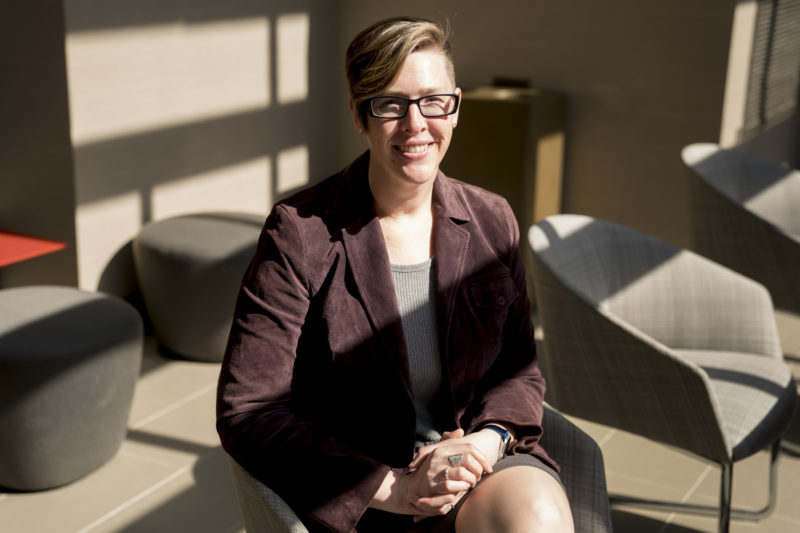 2018 National Teacher of the Year Mandy Manning (AP Photo/Andrew Harnik)
2018 National Teacher of the Year Mandy Manning (AP Photo/Andrew Harnik)
Teacher Mandy Manning hopes to create a sanctuary for her refugee students. This is just one of the reasons why she was named 2018 National Teacher of the Year. Manning has taught English and math at the Newcomer Center at Joel E. Ferris High School in Spokane, Wash. for seven years, and her refugee students come from countries all over the world, inlcuding Syria, Mexico, and Sudan. While her students don’t often feel safe in the current political climate, Manning has helped transform her school by providing a welcoming and supportive environment.
Manning is an active member of her local and state union and serves on the executive committee of the Washington Education Association. On Monday, National Education Association President Lily Eskelsen García sat down with Manning at the NEA Headquarters in Washington, D.C. and took questions on Facebook Live. Here are a few of the highlights from Manning's responses:
On How to be Fearless:
I’ve learned how to be fearless from my students. I teach immigrant refugee students. My students have gone through unspeakable circumstances to come to the United States, a nation that gives them hope to be someone. I watch their innate hopefulness and fearlessness in coming into this new community, a community that in many ways has not welcomed them. They come to school everyday; they’re focused, they’re dedicated, they’re committed to their dreams, and becoming productive members of society and citizens. So, all I have to do is look at them, and they teach me how to be fearless.
On Meeting President Trump at the White House:
Our current administration has not been welcoming to my students, and I wanted to ensure my students that I was there for them. There was a question: Should I go? And they all said, unanimously, “Yes. Because he needs to know about us.” And so we sat down and we had the students write letters about their journeys to the United States and what it meant to them: their dreams and hopes, and how they want to give back to the United States. There was also advice for our current president on how he can help improve their lives in the United States, like using supportive language that doesn’t diminish them as whole groups of people. Wouldn’t it be beautiful if he used loving, kind and welcoming language when talking about these amazing members of our community?
On “Othering” Herself:
I’d always wanted to join the Peace Corps, and it completely changed me. I went to Armenia. It was such a tremendous experience because I’d “othered” myself. I put myself into a situation where I knew no one else was going to look like me, act like me, speak like me, or think like me. I went into it with no expectation, so then I was open to the experience of just being there.
But ultimately, because I put myself in a situation where I was “other,” it helped me get a little bit of perspective on what my students are experiencing, or anyone who has been othered for any reason. I think that’s so important, because we need to seek experiences that challenge our perceptions because our way of thinking, being and doing is not the only way of thinking, being and doing. And in order to be a society and a community that is safe and connected, we need to be open and willing to reach across differences and be willing to get to know each other.
On Public Advocacy:
Everytime educators leave the classroom in order to advocate collectively, our love for our students is used against us. Sometimes, we have to leave the classroom to get the things we need for our kids, because at the heart of every teacher is our students. At the heart of every decision is what our students need. It’s very comfortable to be in our classrooms. But, just like my pin says right here, ‘Life happens outside your comfort zone.’ We have to be willing to get uncomfortable and face some of that negative messaging that we might receive in order to really make deep impacts on what we know is best for kids.
If the decisions that are being made are negatively impacting our kids, we cannot sit idly by, even if it means we’re going to face challenges in the community. Because ultimately, if students truly make up the foundation of our arguments about why we are outside the classroom advocating, no one can argue with us.
On “Real Teaching”
There are different ways of thinking about teaching. There are teachers who are in love with their content. And there are teachers who are in love with their students. The long and short of it is, if you don’t know your students but you know your content, chances are your kids aren’t gonna learn the content.
So, really knowing your kids, using that information intentionally to create lessons that meet their needs, and making them a brighter light than they were when they came into your room - that’s real teaching.







